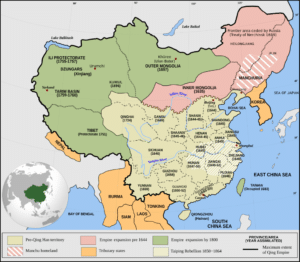The 13th century brought the Mongol conquest of China. In 1271, the Mongol leader Kublai Khan established the Yuan dynasty; the Yuan conquered the last remnant of the Song dynasty in 1279. Before the Mongol invasion, the population of Song China was 120 million citizens; this was reduced to 60 million by the time of the census in 1300. A peasant named Zhu Yuanzhang overthrew the Yuan in 1368 and founded the Ming dynasty as the Hongwu Emperor. Under the Ming dynasty, China enjoyed another golden age, developing one of the strongest navies in the world and a rich and prosperous economy amid a flourishing of art and culture. It was during this period that admiral Zheng He led the Ming treasure voyages throughout the Indian Ocean, reaching as far as East Africa.
In the early years of the Ming dynasty, China’s capital was moved from Nanjing to Beijing. With the budding of capitalism, philosophers such as Wang Yangming further critiqued and expanded Neo-Confucianism with concepts of individualism and equality of four occupations. The scholar-official stratum became a supporting force of industry and commerce in the tax boycott movements, which, together with the famines and defense against Japanese invasions of Korea (1592–1598) and Manchu invasions led to an exhausted treasury.
In 1644, Beijing was captured by a coalition of peasant rebel forces led by Li Zicheng. The Chongzhen Emperor committed suicide when the city fell. The Manchu Qing dynasty, then allied with Ming dynasty general Wu Sangui, overthrew Li’s short-lived Shun dynasty and subsequently seized control of Beijing, which became the new capital of the Qing dynasty.
Late Imperial:
The Qing dynasty, which lasted from 1644 until 1912, was the last imperial dynasty of China.

Its conquest of the Ming (1618–1683) cost 25 million lives and the economy of China shrank drastically. After the Southern Ming ended, the further conquest of the Dzungar Khanate added Mongolia, Tibet and Xinjiang to the empire. The centralized autocracy was strengthened to crack down on anti-Qing sentiment with the policy of valuing agriculture and restraining commerce, the Haijin (“sea ban”), and ideological control as represented by the literary inquisition, causing social and technological stagnation. In the mid-19th century, the dynasty experienced Western imperialism in the Opium Wars with Britain and France. China was forced to pay compensation, open treaty ports, allow extraterritoriality for foreign nationals, and cede Hong Kong to the British under the 1842 Treaty of Nanking, the first of the Unequal Treaties. The First Sino-Japanese War (1894–95) resulted in Qing China’s loss of influence in the Korean Peninsula, as well as the cession of Taiwan to Japan.
The Qing dynasty also began experiencing internal unrest in which tens of millions of people died, especially in the White Lotus Rebellion, the failed Taiping Rebellion that ravaged southern China in the 1850s and 1860s and the Dungan Revolt (1862–77) in the northwest. The initial success of the Self-Strengthening Movement of the 1860s was frustrated by a series of military defeats in the 1880s and 1890s.
